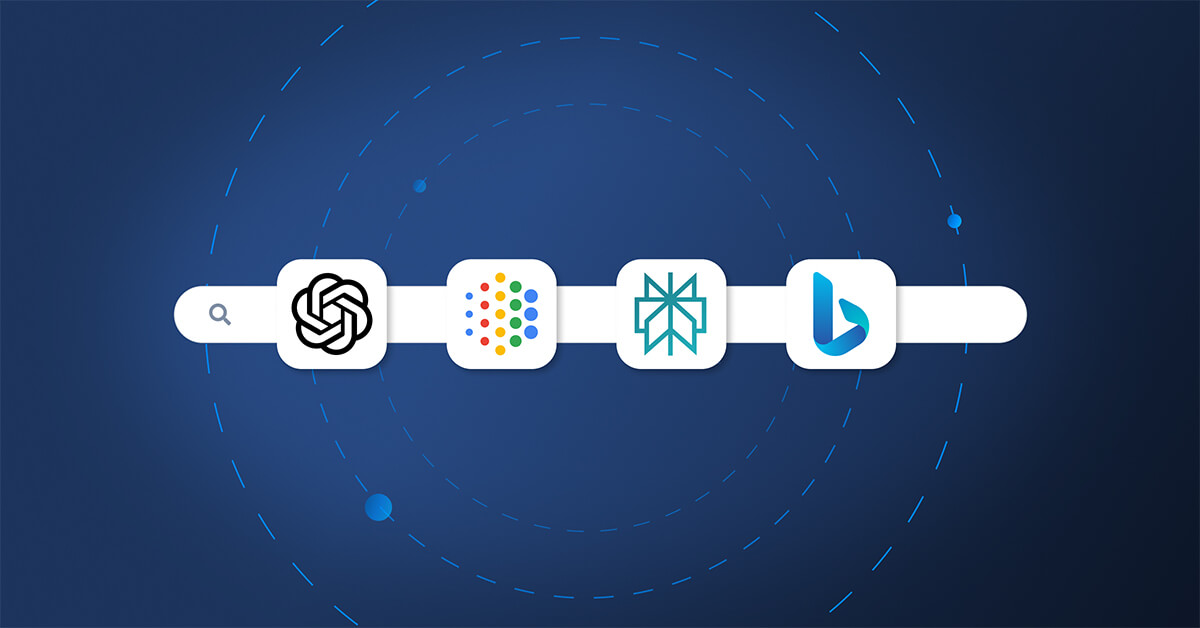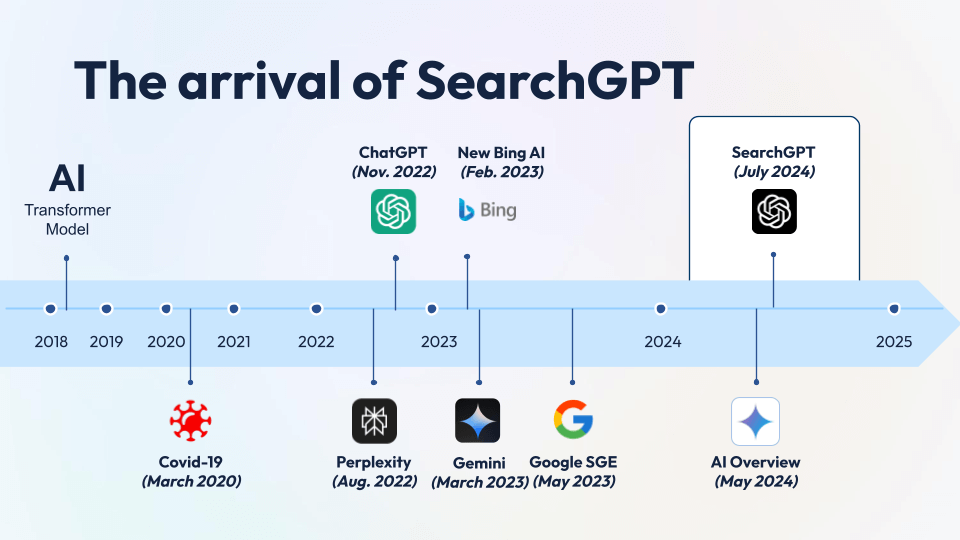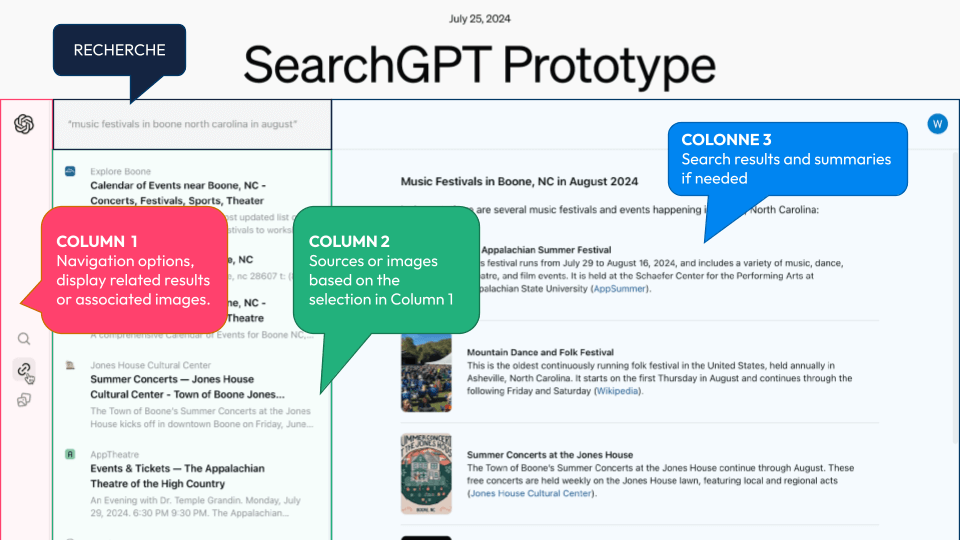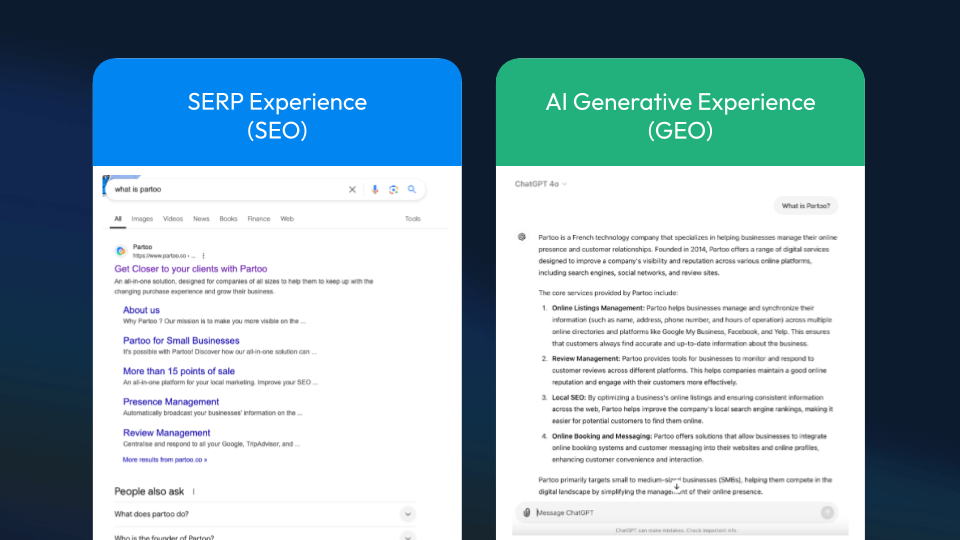
Is the Pharmaceutical Sector in Saudi Arabia Unlocking the Full Potential of Online Visibility and E-Reputation?
In today’s digital-first landscape, a pharmacy’s online reputation and local visibility can strongly influence a…

Table of contents
For several decades, Google has established itself as the undisputed leader of search engines. However, over the past two years, profound changes in the way people search online have altered the game, particularly since the summer of 2024. Generative artificial intelligence is paving the way for new ways to search and interact with information online. Let’s have a look!

To help you understand what generative engines are and how to prepare for them, watch our webinar on October 15th and learn everything you need to know about GEO (Generative Engine Optimization)!

For the past ten years, well before the arrival of AI-boosted search engines, Google has been facing increasing competition from social media, particularly TikTok and Instagram.
Following the Covid period, these platforms gradually became search engines for younger generations, especially Generation Z, who favour more visual and immersive formats.
In February 2023, Google officially recognised TikTok as a competitor, admitting that 40% of young Americans preferred TikTok or Instagram for online searches – especially for restaurants, hotels, or travel advice.
Unlike traditional search engines, these platforms offer a more immersive discovery, where information is presented in the form of short videos, photos, and user-generated content (UGC), creating a new search dynamic that is more visual and direct.
With the arrival of generative artificial intelligence technologies, the online search landscape has changed dramatically. These new technologies not only generate responses to queries but also reformulate, synthesise, and interpret information according to the context.

Here’s an overview of the key players in this new wave of search engines:
Launched in August 2022, Perplexity is a search engine that offers responses in the form of AI-generated summaries. Unlike Google, which displays a list of results in the form of links, Perplexity produces a textual synthesis based on several reliable sources. It currently registers 230 million searches per month in the United States and is experiencing an exponential growth, with traffic increasing eightfold in just 12 months.
This model is attractive due to its user-friendly approach, as users no longer need to click on multiple links to obtain a complete answer. Perplexity uses the data available online in a more targeted and synthetic manner, making the search experience more seamless and direct.
OpenAI, with its ChatGPT model, has reshaped expectations in online search. ChatGPT, particularly in its SearchGPT version launched in 2024, offers a conversational experience where users interact with the search engine in a more human and dynamic way.
The goal of SearchGPT is not simply to respond to queries with links, but to provide AI-generated answers that adapt to the context and nuances of the question asked.
SearchGPT is still in its development phase, accessible only by invitation. However, its potential is immense, as it offers a direct alternative to Google, focusing on the quality of responses rather than the quantity of displayed results.
Microsoft, through Bing, has invested heavily in artificial intelligence to develop New Bing, a search experience that integrates conversational elements similar to ChatGPT. Thanks to its partnership with OpenAI, Microsoft has integrated advanced AI features into Bing, offering an enriched user experience.
New Bing combines traditional aspects of search, with blue links, while adding AI-generated blocks called Generative Search. Users can thus obtain a summary of their query while accessing traditional results, offering a unique dual approach in the market.
In response to the rise of AI technologies, Google had to react to maintain its dominant position in online search. In May 2023, the company launched the Search Generative Experience (SGE), followed in May 2024 by its evolution, AI Overview.
AI Overview combines AI-generated responses with traditional links, similar to New Bing, but stands out with a generative block appearing at the top of organic results. Although this feature is still in the testing phase, Google plans a gradual rollout, first in the United States and then in Europe by 2025.
The beginnings of AI Overview were not without challenges, with some incorrect or off-the-mark responses. However, Google is constantly refining its algorithms to ensure that generative AI enhances the user experience. Despite the emergence of new players like SearchGPT and New Bing, Google remains firmly entrenched in user habits thanks to its rich databases, such as Google Maps and Shopping, which strengthen its position.
The most significant event of the summer of 2024 was the launch of SearchGPT by OpenAI. Announced long in advance, this search engine is based on a generative interface where responses are both AI-generated and accompanied by links to websites. Unlike Google, SearchGPT does not display advertisements, which could be an asset in a context where users seek information without being overwhelmed by ads.
The strength of SearchGPT lies in its ability to revolutionise the way queries are processed. Rather than being limited to keywords and links, the engine analyses the context and meaning of queries to provide a precise and tailored response. This fundamentally changes how users interact with search, making the experience more seamless and intuitive.

However, the question of SearchGPT’s business model remains open. Given the high cost associated with generating AI responses, it is still uncertain if this ad-free model is sustainable in the long term.
OpenAI may need to integrate a form of monetisation, whether through discreet advertisements or partnerships, to maintain this service on a large scale.
With the emergence of these new AI search engines, traditional SEO is evolving towards GEO (Generative Engine Optimisation). The goal of GEO is to optimise how generative engines, like SearchGPT or AI Overview, use a site’s data to generate responses.
The principles of GEO are similar to those of SEO, but adjustments are necessary. For example, using structured data (via Schema.org) and content well-adapted to user queries, such as FAQs or practical guides, is crucial to influence the results generated by these new AIs.

AI engines, like AI Overview or SearchGPT, rely on both structured data (tags, metadata) and unstructured data (texts, images, videos). To maximise their visibility in this new ecosystem, businesses must ensure that their data is accessible and optimised to be effectively integrated into AI-generated responses.
One of the central elements for generative search engines is user-generated content, particularly online reviews. Unlike brand-created content, reviews are perceived as more reliable and unbiased sources by AI engines.
As a result, businesses must focus on managing their customer reviews, ensuring they respond to and encourage these reviews, as they will increasingly be used in AI engines to influence the generated responses. Solutions like those offered by Partoo, which allow for the efficient collection and management of online reviews, are therefore essential in this new era of GEO.
The future of online search promises to be rich in innovations. Generative search engines pave the way for longer and more complex searches, more personalised responses, and a user experience enhanced by multimedia content (videos, sounds, images).
Google, thanks to its strong presence and massive databases (such as Maps and Shopping), will continue to play a leading role in this evolution, even as new players emerge.
Companies like Partoo are actively participating in this transformation, helping retailers optimise their online presence, whether through store locators, review management, or local data optimisation.
The era of AI search engines is just beginning, and those who adapt quickly to these new technologies will reap the rewards of this digital revolution.
In conclusion, generative artificial intelligence is profoundly transforming online search, opening up new opportunities for businesses.
However, to take advantage of this new era, it is essential to understand and anticipate changes in SEO, GEO, and review management. Partoo positions itself as a key player in this ecosystem, ready to support businesses in this ongoing digital transformation.
Feel free to contact us to learn more about our solutions or to participate in our upcoming webinars on AI and online search.
Want to easily develop your business through the Internet? It’s possible thanks to Partoo!
Download our 2025 barometer and discover which companies manage their online reputation the best, along with recommendations to enhance your business!
Receive our best articles and practical guides directly in your inbox every month